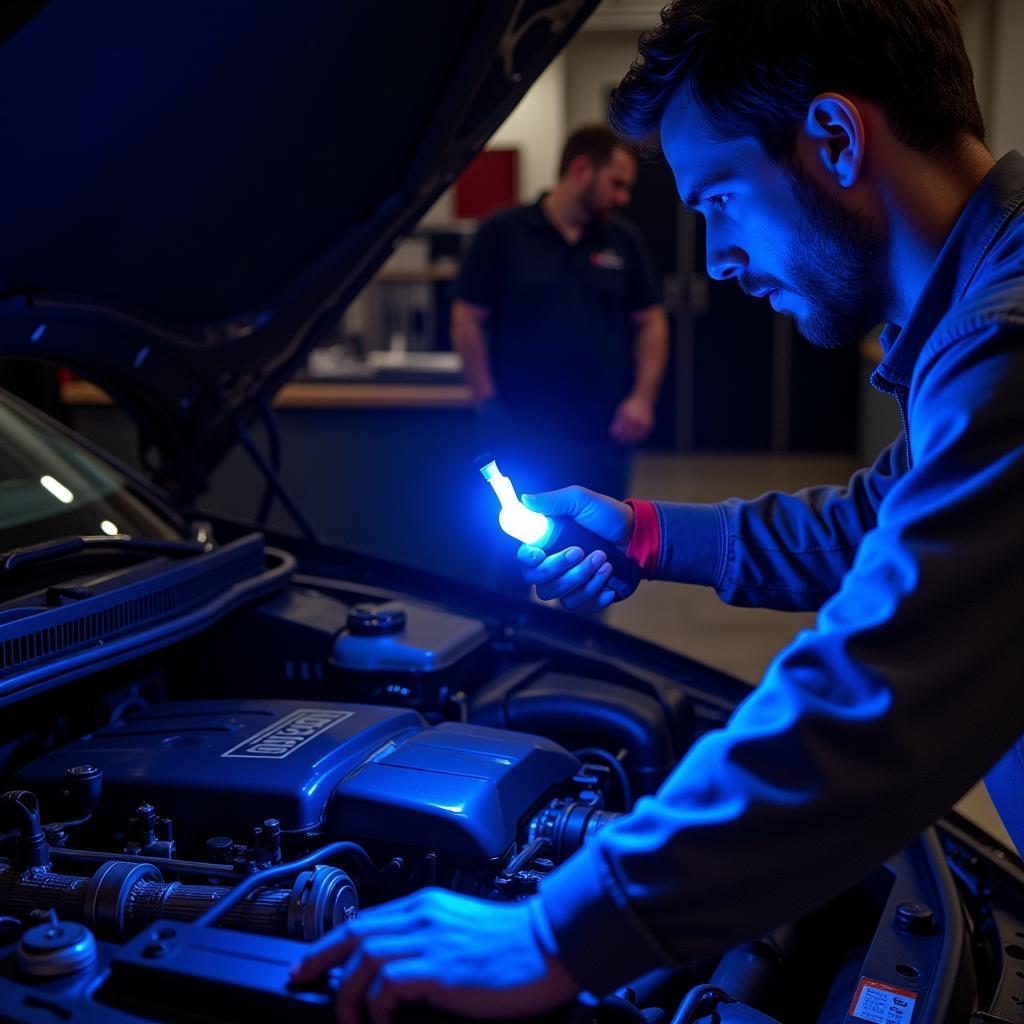Experiencing a warm breeze instead of cool air from your car’s AC? You’re likely dealing with an AC leak. Fixing an AC leak in your car can seem daunting, but with this comprehensive guide, you’ll be equipped with the knowledge to troubleshoot the problem and even tackle some repairs yourself.
Understanding Your Car’s AC System
Before diving into how to Fix Ac Leak Your Car, it’s helpful to understand the basic components of your car’s air conditioning system. The system relies on refrigerant, a special fluid, to absorb heat from the cabin. This refrigerant circulates through a closed system of hoses, a compressor, a condenser, and an evaporator. A leak in any part of this system can cause the AC to malfunction.
Common Causes of Car AC Leaks
Several factors can contribute to AC leaks in your car. Age and wear are common culprits, as hoses and seals can become brittle and crack over time. Road debris, vibrations, and even small accidents can also damage AC components and lead to leaks. Corrosion, often due to exposure to moisture and road salt, can also weaken components and cause leaks.
Diagnosing an AC Leak
The first sign of an AC leak is often warm air blowing from the vents. Other indicators include a hissing sound when the AC is on, a noticeable decrease in cooling performance, or a strange, sweet smell inside the car. If you suspect a leak, you can perform a few simple checks. Look for oily residue around AC components, or use a UV dye kit designed specifically for detecting AC leaks. These kits usually involve adding a fluorescent dye to the refrigerant and then using a UV light to pinpoint the leak.
How to Fix AC Leak Your Car: DIY Options
For minor leaks, some DIY fixes might be possible. If the leak is at a hose connection, tightening the clamp or replacing the o-ring might resolve the issue. However, be aware that working with refrigerants requires caution. Refrigerant is a pressurized gas and can be hazardous if mishandled. If you’re unsure about any step, it’s always best to consult a qualified mechanic.
Professional AC Leak Repair
For more complex leaks or if you’re uncomfortable working with refrigerants, professional repair is recommended. A qualified mechanic has the tools and expertise to diagnose the leak accurately, repair or replace damaged components, and recharge the system with the correct amount of refrigerant.
What to Expect at the Repair Shop
When you take your car to a mechanic for an AC leak repair, they’ll typically perform a thorough inspection of the AC system, using specialized tools to pinpoint the leak. They might also perform a pressure test to check for leaks and assess the overall system integrity. Depending on the location and severity of the leak, the repair might involve replacing hoses, seals, or even entire components like the compressor or condenser. After the repair, the system will be evacuated and recharged with refrigerant.
 Mechanic Using UV Light to Detect AC Leak
Mechanic Using UV Light to Detect AC Leak
Preventing Future AC Leaks
Regular maintenance is key to preventing future AC leaks. Have your car’s AC system inspected annually by a qualified mechanic, especially before the start of the hot season. This inspection should include checking for leaks, inspecting hoses and seals for wear and tear, and ensuring the system is properly charged. Keeping your car clean and free of debris can also help prevent damage to AC components.
“Regular preventative maintenance is the best way to avoid costly AC repairs down the line,” says John Smith, Senior Automotive Technician at Auto Experts Inc. “A simple annual check can identify potential issues before they become major problems.”
Conclusion
Fixing an AC leak in your car is essential for maintaining a comfortable driving experience, especially during warmer months. While some minor leaks can be addressed with DIY fixes, professional repair is often the best course of action for more complex issues. By understanding the common causes of AC leaks, how to diagnose them, and the different repair options available, you can make informed decisions and keep your car cool and comfortable. For assistance with your car’s AC or any other automotive needs, connect with us at AutoTipPro at +1 (641) 206-8880 or visit our office at 500 N St Mary’s St, San Antonio, TX 78205, United States.
FAQ
-
How often should I recharge my car’s AC? Typically, every 2-3 years, or as needed if you notice a decrease in cooling performance.
-
Can I use any refrigerant to recharge my car’s AC? No, you must use the correct refrigerant specified for your car model. Using the wrong type can damage the system.
-
How much does it cost to fix an AC leak? The cost can vary depending on the location and severity of the leak, but typically ranges from a few hundred to over a thousand dollars.
-
What is the most common cause of car AC leaks? Age and wear on hoses and seals are the most frequent causes.
-
How can I tell if my car’s AC compressor is bad? Common signs include loud noises, lack of cold air, and oily residue around the compressor.
-
Can I drive my car with an AC leak? Yes, but it’s not recommended. Continuing to drive with a leak can lead to further damage to the AC system and potentially other components.
-
How long does it take to fix an AC leak? The repair time can vary depending on the complexity of the leak, but typically ranges from a few hours to a full day.




Leave a Reply